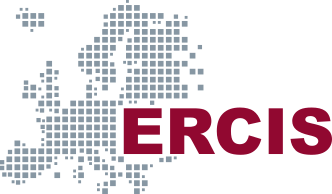The Network for Research
ERCIS is and international research network in the field of Information Systems, fostering collaboration across borders, e.g. through joint EU-funded research projects. These projects tackle critical challenges in current topics around digital transformation, driving innovation and practical solutions. ERCIS facilitates researcher visits, promoting the exchange of ideas, expertise, and best practices among top academics and industry professionals worldwide.
Partners benefit from a rich, collaborative environment that enhances research quality, offers access to diverse funding opportunities, and cultivates a global perspective on emerging technological trends, significantly contributing to the advancement of information systems research and practice.
Publications
Possessing the vast resources offered by the ERCIS network allows us to produce joint publications incorporating a plethora of disparate views, areas of specialty, and abilities. Contributions from our partners often appear in prestigious scholarly journals and conference proceedings – the universally recognized benchmarks for evaluating academic excellence. Find below some examples of our most reason publications:
Research Projects
ERCIS partners successfully conducted research projects funded by the European Commission, national governments and regional bodys. Additionally, ERCIS partners work closely with industry, tackling the most current challenges right where they appear.
See some signature projects, including a large number of ERCIS partners below:
- CODEAI
- VOIL
- RISE_SMA
- RISE_BPM
- EQUAL-IST
CoDeAI aims at leveraging SMEs’ AI-based innovation capability by investigating the AI deployment using recent productivity tools like AutoML and supporting the co-creation of AI-based data-driven business models.
CoDeAI will implement technology feasibility studies with the goal of developing AI use cases and success stories for SMEs, investigating the knowledge demand of SMEs regarding the AI deployment using productivity tools and incorporating AI capabilities in universities’ curricula.
The CODEAI project features ERCIS partners from Portugal and Germany.
Rapid developments in digitalization pose pressure for firms to innovate and transform their businesses by implementing digital technologies and business models. Many firms struggle with understanding the opportunities and consequences of digitalization. These difficulties are particularly demanding for small firms due to their general lack of resources, knowledge and skills.
In order to accelerate the digital transformation of small & medium enterprises, higher education institutions need to adopt effective strategies to develop advanced digital skills in their students, future employees of these companies. Therefore, the target groups of the VOIL project are educators and students in Universities as well as young workers and entrepreneurs/managers of small and medium enterprises.
The project has two main objectives: (1) to raise awareness about the potential of emerging technologies, tools and methods in the course of the digital transformation of micro, small & medium enterprises, and (2) to design a pedagogical model for simulation-based learning of advanced digital competencies.
There are ERCIS partners from the following countries involved: Portugal, Lithuania, Germany, Norway
RISE_SMA forms an interdisciplinary, international network combining excellent scholars and practitioners to enable vigorous knowledge sharing and to develop solutions for contemporary challenges for Social Media Analytics (SMA).
Advanced theoretical approaches and methods of analysing social media data are especially relevant for two domains addressed in RISE_SMA: society and crisis communication. Recently, social media communication gained immense impact on society and decision-making at all levels. It offers potential for new forms of public discourses, but also challenges societal cohesion phenomena like fake news and vicious social bots.
During uncertain events such as natural disasters or human-made crises, social media communication plays an increasingly important role for citizens and emergency service agencies. RISE_SMA attempts to uncover communication patterns and suggest best practices to seek and share information in precarious situations.
In this project, ERCIS partners from the following countries were involved: Germany, the Netherlands, and Norway.
The RISE_BPM project is aimed at networking world-leading research institutions and corporate innovators to develop new horizons for Business Process Management (BPM). BPM is a boundary-spanning discipline focused on division and re-integration of day-to-day work in organisations and on analysis of process data for organisational decision-making. Recent breakthrough innovations in Social Media, Smart Devices, Real-Time Computing and Big Data Technology create a strong impetus for propelling BPM into a pervasive corporate topic that enables design of entirely new products and services.
In this project, ERCIS partners from the following countries were involved: Australia, South Korea, Brazil, Austria, Spain, the Netherlands, and Liechtenstein
The EQUAL-IST project (Gender Equality Plans for Information Sciences and Technology Research Institutions) aimed at introducing structural changes to enhance gender equality in Information Sciences and Technology (IST) research institutions. It has been demonstrated that IST is among the research sectors most affected by gender inequalities at all levels. The project aims to address ERA objectives in relation to gender equality by supporting seven Research Performing Organisations (RPOs) from Northern, Southern and Central European countries, as well as one CIS (Commonwealth of Independent States) country in developing and implementing tailored Gender Equality Plans (GEPs). All RPOs forming the EQUAL-IST project consortium are at a starting stage in setting up of GEPs and they have also ensured the support in GEPs implementation from the respective highest management levels.
The project combines gender mainstreaming and positive actions on three main levels:
- HR practices and management processes,
- Student services and institutional communication,
- Research design and delivery.
For addressing and solving issues of horizontal and vertical segregation in research and administrative careers, work-life balance, gender imbalance in student enrolment, and gender neutral/blind approach to IST research, the EQUAL-IST project is aimed at influencing organizational structures, discourses, and behaviours.
The EQUAL-IST project featured ERCIS partners from Germany, Liechtenstein, Finland, Lithuania, Portugal, and Ukraine.

